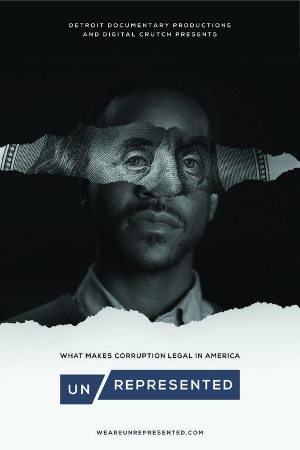
UnRepresented 2019
Distributed by Collective Eye Films, 1315 SE 20th Ave. #3, Portland OR 97214; 971-236-2056
Produced by Andrew Rodney, Natalie Shaheen, Eric Bruggemann, and Hannah Noel
Directed by Daniel Falconer
Streaming, 56 mins
College
Activism; Democracy; Government
Date Entered: 08/23/2021
Reviewed by Russell A. Hall, Reference and Instruction Librarian, Penn State ErieIt is no secret that there are problems in American democracy. But like the weather, everyone talks about the system being broken but nobody does anything about it. The filmmakers of UnRepresented seek to explain to its viewers what they believe the main problems of American democracy are and offer solutions for fixing those problems.
Josh Silver, co-founder of the election reform group RepresentUs, lays out the general message of the film early on when he states, “The system is corrupt. Members of Congress are not corrupt, for the most part. So, we have to make that distinction and then we have to set about changing those laws so that corruption is no longer legal. But today corruption is legal in America.” The filmmakers proceed from there to describe the interconnected cycle of the three activities they state are the basis for corruption in American government: campaign finance, lobbying, and unlimited debt.
The section on campaign finance explains how money can buy access to members of Congress that the general citizenry does not have. The vast amount of money needed to run a campaign also necessitates constant fundraising. UnRepresented also presents a damning statistic where it is estimated that 30 to 70 percent of a politician’s time is spent fundraising, which leaves little opportunity for governing. From here the cycle moves to lobbying, where companies and industries have their agents represent their interests to congresspeople. Again, the influence of money is on display, but the film also reveals the semi-hidden “revolving door” where politicians move to lucrative jobs with lobbying firms after they retire from public service. The most intriguing discussion of corruption in the film comes when unlimited federal debt is discussed. This allows both parties to infinitely delay difficult decisions about taxation and spending, so they don’t have to discuss difficult votes with their constituents. Both Republicans and Democrats benefit from this because everyone gets what they want either in terms of priorities or rhetoric to use against the other party. However, these costs will have to have a reckoning at some point because borrowing at interest cannot go on forever.
When moving to potential solutions to the problems, interviewees seem to agree that change is unlikely to happen at the federal level, therefore they offer solutions that start at the state and local levels. One method is to pass anti-corruption laws at those lower levels of government and hope to hit a tipping point where the federal government is compelled to pass an anti-corruption law (the Women’s Suffrage Movement is used as the historical example). Another method would be through publicly funded vouchers where each citizen would be able to give a voucher or a portion of a voucher to a candidate to provide money to their campaign. The most controversial method described in UnRepresented is calling for a Constitutional Convention as described in Article V of the Constitution whereby two-thirds of the state legislatures can call for a convention to amend the Constitution and then be ratified by three-quarters of the states. One former congressman calls this method risky, while the proponents in the film say that the prospect of a “Runaway Convention” are simply scare tactics. Those proponents also claim that legal research points to a “Runaway Convention” not being able to occur but fail to state that this is only the conclusion of some researchers and not a consensus view. Further they also neglect to note that since an Article V Convention has never been called before, one cannot say with certainty that serious consequences might not occur at a convention. Finally, the advocates of the Article V Convention seem to view the state legislatures through rose-colored glasses, as their statements give much those governmental bodies accolades that one normally only hears spoken about the Founders.
UnRepresented is recommended with reservations. The film is quite well done, with excellent visuals, particularly the animated charts. UnRepresented is also successful in making its points about corruption in the U.S. federal government. However, in making those points, there are certain nuances that are not addressed, such as the potential perils of an Article V convention. The film could be used in courses in political science on American government, political economy, lobbying, campaigns, or democratic reforms. Because UnRepresented is very viewpoint driven, the problems and suggested solutions in the film need to be placed in the broader context of government reform and history, as well as considering other possible solutions and the potential pitfalls of the solutions offered.
Awards: Best Documentary, Reel to Reel Film Festival 2019; Official Selection, Rome International Film Festival 2019
Published and licensed under the Creative Commons Attribution 4.0 license. Anyone can use these reviews, so long as they comply with the terms of the license.